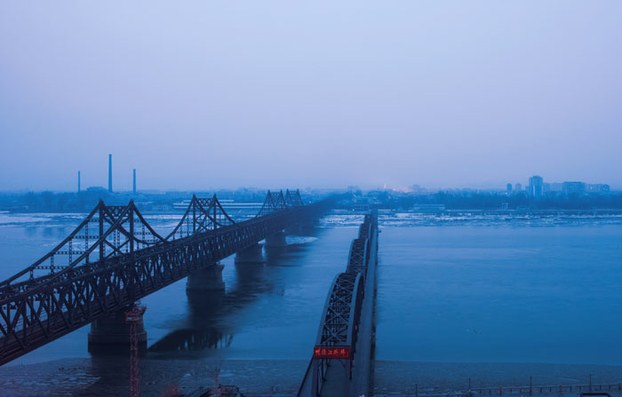U.N. sanctions fail to cool Chinese ardor to invest in North Korean businesses
| Publisher | Radio Free Asia |
| Publication Date | 18 August 2016 |
| Cite as | Radio Free Asia, U.N. sanctions fail to cool Chinese ardor to invest in North Korean businesses, 18 August 2016, available at: https://www.refworld.org/docid/57d8fd6d26.html [accessed 21 May 2023] |
| Disclaimer | This is not a UNHCR publication. UNHCR is not responsible for, nor does it necessarily endorse, its content. Any views expressed are solely those of the author or publisher and do not necessarily reflect those of UNHCR, the United Nations or its Member States. |
2016-08-18
 The Yalu River in the Chinese border town of Dandong, opposite the North Korean town of Sinuiju, Feb. 8, 2016. AFP
The Yalu River in the Chinese border town of Dandong, opposite the North Korean town of Sinuiju, Feb. 8, 2016. AFP
Despite U.N.-imposed financial sanctions, many North Koreans are benefiting from an injection of Chinese cash that sources say is helping underwrite business in Sinuiju city that range from a taxi service to high-rise apartment complexes.
"There are many businesses in which Chinese people invest in Sinuiju, which are not widely known to the outside world," explained a Chinese businessman who manages a sewing factory in the city.
"Chinese investment in North Korean businesses are made regardless of U.N. sanctions against the country," he told RFA's Korean Service.
Sinuiju lies across the Yalu River from Dandong, China, and is the epicenter of North Korea's international trade, both legal and illegal. China is North Korea's only formal major ally, and accounts for more than two-thirds of the country's trade.
The reports of Chinese investment come after the U.N. imposed new sanctions against North Korea following a nuclear test and a rocket launch in January and February, respectively.
China agreed to the sanctions, but there have always been serious questions about its willingness to enforce the measures or take other steps to pressure Pyongyang.
While the sanctions included restrictions on financial dealings with North Korea, Chinese investment in individual businesses appears to skirt the U.N. resolution, which allows transactions with North Korea for "livelihood purposes."
To find evidence of Chinese investment in Sinuiju, one needs only to hail a cab, the source explained to RFA.
"Unlike the taxis in Pyongyang, taxis in Sinuiju are dressed in red and are neatly designed," the businessman said. "A Chinese-invested taxi business opened in Sinuiju not too long ago. It is the second time that Chinese BYD [a Chinese automobile manufacturer] vehicles will be used as taxis."
BYD taxis are also used in Pyongyang, but they are not as nice, the source told RFA.
Benefits for the wealthy
A wealthy North Korean customer could take one of the red-liveried cabs to the Chung Ryun [Youth] Store in Sinuiju and buy some fancy clothes, in what the source says is another Chinese-backed business.
"A large-scale luxury clothing store with the sign 'Chung Ryun Store,' which is a Chinese-invested business, opened in Sinuiju not too long ago," the source said, adding: "The store manager is the wife of Sinuiju's transportation director."
That same wealthy Korean's new clothes could have been stitched up from material produced in a sewing factory that was also built with Chinese financing, another source in China told RFA.
"There are also several large and small roll-to-roll processing sewing factories and wig factories that Chinese people have invested in," that source said.
Once the wealthy North Korean customer has outfitted themselves with stylish new clothes, he could head home to an apartment in a high-rise that was built with a healthy injection of Chinese cash.
"High-rise apartments that were built last year in Sinuiju were reported to have been backed by rich North Koreans," the source told RFA. "However, this is false information. These apartment buildings were built from investments made by the Chinese."
After unpacking the stylish new clothes, the same wealthy North Korean could step around the corner and pick up a quart of milk and some tea at a convenience store that was built with Chinese investments.
"Most convenience stores that have opened in North Korea's border cities, including Hyesan City and Sinuiju City, are also stores invested in by the Chinese," the source said.
If that wealthy Korean was taking the taxi because his car was broken, he might soon be able take it to a Chinese-backed repair shop.
"Recently, a Chinese private business and Sinuiju authorities have been consulting on the establishment of an auto repair shop in Sinuiju," the source explained. "That investment will be made soon."
Reported by Joonho Kim for RFA's Korean Service. Translated by Jackie Yoo. Written in English by Brooks Boliek.
Link to original story on RFA website
